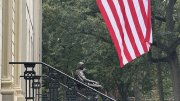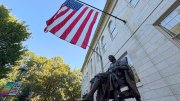The Trump administration’s decision to freeze more than $2.2 billion of Harvard’s research funding was unconstitutional, a federal judge ruled on Wednesday, ordering the federal government to restore the funds. The White House, which has been engaged in settlement talks with the University throughout the summer, immediately vowed to appeal the decision.
In her ruling, U.S. District Judge Allison D. Burroughs wrote that the federal government violated Harvard’s First Amendment rights when it announced in April that it would withhold scientific and medical research funding from the University over allegations of antisemitism.
“Harvard has been plagued by antisemitism in recent years and could (and should) have done a better job of dealing with the issue,” Burroughs acknowledged. “That said, there is, in reality, little connection between the research affected by the grant terminations and antisemitism.” The government, she added, “used antisemitism as a smokescreen for a targeted, ideologically-motivated assault on this country’s premier universities.”
In its oral arguments before Burroughs in July, the government had claimed that the funding cuts were a legitimate response to incidents of antisemitism on Harvard’s campus in the wake of October 7, 2023, Hamas terrorist attacks on Israel and the subsequent war in Gaza.
When citing instances of antisemitism in court, the government drew largely on Harvard’s internal antisemitism report, which was first released on April 29—two weeks after the Trump administration announced the funding cuts totaling more than $2.2 billion. In fact, the judge pointed out in Wednesday’s ruling, the administration’s original freeze order “did not identify any specific instances of antisemitism on Harvard’s campus.”
In light of this evidence, Burroughs determined that the Trump administration was retaliating against Harvard for exercising its First Amendment rights, encroaching upon the University’s academic freedom, and using antisemitism allegations as a pretext to punish the University for its protected speech.
“The research was frozen without any sort of investigation into whether particular labs were engaging in antisemitic behavior, were employing Jews, were run by Jewish scientists, or were investigating issues or diseases particularly pertinent to Jews,” Burroughs wrote. Before freezing funds, she continued, the government “considered little, if any, data regarding the antisemitism problem at Harvard [and] disregarded the substantial policy and other changes Harvard had taken and was continuing to take to address the issue.” Concluding her 84-page ruling, Burroughs wrote, “Combatting antisemitism cannot be accomplished on the back of the First Amendment.”
The court ordered that all of Harvard’s federal research funding that had been terminated since April 2025 be restored and instructed the government to refrain from freezing any additional funds—or refusing to award future funding—in retaliation for the University’s exercise of its First Amendment rights.
But it was unclear Thursday what would happen to the research funding in the event of an appeal, which the White House immediately vowed to file. On Wednesday night, White House spokesperson Liz Huston reiterated the administration’s longstanding position that Harvard does not have “a constitutional right to taxpayer dollars,” adding that the government would “appeal this egregious decision, and we are confident we will ultimately prevail in our efforts to hold Harvard accountable.”
Addressing the court’s decision in a message to the Harvard community on Wednesday night, President Alan M. Garber said that the ruling “affirms Harvard’s First Amendment and procedural rights, and validates our arguments in defense of the University’s academic freedom, critical scientific research, and the core principles of American higher education.” Although he made no direct mention of the White House statement, Garber added that the University “will continue to assess the implications of the opinion, monitor further legal developments, and be mindful of the changing landscape in which we seek to fulfill our mission.”
Harvard Faculty React to Funding Decision
Harvard faculty, including those who have been impacted by federal funding cuts, expressed cautious optimism about the outcome of the case. “I am grateful for the rule of law in our country and for our society supporting science,” said Gund professor of neurosciences and of molecular and cellular biology Sharad Ramanathan. “I hope we will again be able to pursue scientific questions that are critical for improving health and human services.” Ramanathan, who studies how stem cells give rise to complex tissues in the human embryo, lost grants worth about $1.5 million per year as a result of the funding freeze.
“The decision yesterday was a really good outcome,” said Francesca Dominici, the director of the Harvard Data Science Initiative and Gamble professor of biostatistics, population, and data science at the Chan School of Public Health, in an interview with WBUR. Dominici’s lab, which develops artificial intelligence models to prevent disease and death from exposure to environmental contaminants and extreme weather events, lost more than $5 million in research funding. As a result, several team members had to leave the lab. “We had postdoctoral fellows in my lab [who] didn’t know whether or not they would be able to pay rent,” she said. “Getting all of your research funding that you have worked a lifetime [for] stripped away, it was very, very painful.”
Eliot University Professor Lawrence H. Summers celebrated the court’s decision in a post on X. “However one feels about the issues that have been divisive,” wrote the president emeritus, “this is a moment to be proud of the University and of President Alan Garber. Because of Harvard’s actions, the federal judiciary has taken a strong stand against extra-legal, due-process-denying, overly political, and authoritarian actions by the current administration.”
Summers noted, however, that Harvard’s fight was far from over. “This decision will be appealed. Other universities remain in the crosshairs,” he said. “But this was a good day for Harvard—and an even better day for American democracy.”
Ramanathan, too, remains worried about Harvard’s future and stressed the ongoing, negative impacts of the funding cuts. “There is certainly a sense of urgency,” he said. “Many of the spectacular students and postdoctoral fellows whom we have trained are looking abroad for opportunities, as are faculty.” Absent renewed support for scientific research from agencies such as the National Science Foundation and the National Institutes of Health, Ramanathan fears, “we will lose a generation of scientists because of the punitive actions of the administration.”
Recent public comments by members of the Trump administration seem to indicate that they are “enjoying destroying institutions,” he added, making him “less optimistic about our collective future.”
Ramanathan referred in particular to U.S. Secretary of Commerce Howard Lutnick, who, speaking at a Cabinet meeting last week, praised the administration’s cross-agency efforts to pressure the University. “We just have a blast, you know? Because Linda’s hitting Harvard,” Lutnick said, of U.S. Secretary of Education Linda McMahon, “and she says, ‘What can we do?’ Now we send them a patent letter and hit them again.”
Earlier this month, the Trump administration opened another front in its dispute with the University by targeting Harvard’s patents. President Garber received a letter from Lutnick, stating that the University is “in breach of the statutory, regulatory, and contractual requirements tied to Harvard’s federally funded research programs and intellectual property arising therefrom, including patents.” The federal government would initiate an “immediate comprehensive review of compliance,” the letter said, to determine whether the University has failed to disclose or patent its inventions.









